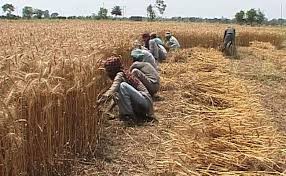
Farmer leader Jagjit Singh Dallewal’s indefinite fast entered its 43rd day as the Parliamentary Standing Committee on Agriculture, has recommended a “legally binding” MSP. Minimum Support Price (MSP) refers to the price the government offers to crops to buy from farmers in a bid to rescue them from hefty losses caused by market prices.
Key Aspects of MSP:
-
Established by: Set by the CACP in consultation with the Ministry of Agriculture and approved by the CCEA in India.
-
Crops Covered: MSP is declared for 23 crops including cereals, pulses oilseeds, and Commercial crops such as cotton and Jute.
Purpose
-
Stabilise farmer’s income.
-
Hedge against fluctuation of price.
-
Fund agriculture and discourage the sale of produce at low prices to evade the market.
Need for MSP for Farmers
-
Income Stability
-
MSP guarantees the farmers against loss-making due to either a price drop occasioned by a glut or low market demand.
-
Example: The price for moong in Rajasthan in 2024 was incidentally ₹6,467 per quintal although the MSP was ₹8,682.
-
-
Inequitable Market Dynamics:
-
Most farmers exercise little negotiation power on traders and sell their produce in local markets which offer very low prices in most cases below the MSP.
-
Data: Market retail structure tells that more than 80 of farmers rely on APMC.
-
-
Rising Costs of Production:
-
So while MSP is an important way through which farmers get their costs met, rising input costs including fertilizers and diesel make MSP essential for ensuring a profitable income.
-
Example: The cost of fertility and diesel between 2020 and 2024 increased by 15-20% (Ministry of Agriculture).
-
-
Addressing Rural Poverty:
-
MSP is helpful to avoid the forced sale of agricultural produce and help the small and marginalized farmers of India who are 86%of the farmers in the country.
-
Challenges of Full Legalization
-
High Fiscal Cost: If MSP was given directly to all MSP crops its total amount would go all the way to ₹7.5 lakh crore per annum, fully constituting 17% of the Union Budget and leaving very little for anything else.
-
Market Disruption: High mandatory MSP can have adverse effects such as market crowding out of the private sectors and effectiveness leading to reduced market competitiveness.
-
Administrative Complexity: Supervising the application of MSP in millions of farmers and different regions of production and crops is not an easy task.
-
Alternative Approaches:
-
Deficit Payment Scheme: You can pass on the rest benefits without direct procurement to the farmers such as the difference between Market Price (MP) and MSP.
-
Private Sector Role: This means that one should make private buyers buy what is within or above the MSP to help share these costs.
-
Market Intervention: Fixed a minimum floor price for commodities to be auctioned in APMC thereby stabilizing the actual market rates.
-
Direct Compensation Model: Both introduce price difference compensation which is expected to peg the cost at approximately ₹30,000-₹50,000 crore in a year.
Limitations of MSP
-
Budgetary Stress: It is equally important to know that absorbing 17% of the budget for MSP would mean less investment in absolute priorities like health, education, and infrastructure among others.
-
Regional Inequity: Today’s MSP benefits are mainly(with majority stakeholders) with those states like Punjab Haryana and UP while sidelining the farmers of other underdeveloped states.
-
Environmental Risks: Where there are guaranteed MSPs, there is often increased cultivation of water-intensive crops and hence increased water strain and depletion of water sources.
-
Market Inefficiencies: Implementation of such a policy as MSP to regulate the market may discourage private enterprises leading to market inefficiencies and lesser innovations.
Way Ahead
-
Expand MSP Procurement: Need to enhance inclusion; add pulses, oilseeds, and millets.
-
Empower Farmer Producer Organizations (FPOs): Enshrine collective bargaining, and improved markets for farming populations.
-
Leverage Technology: Some actions that could be involved include utilizing e-NAM and blockchain technology for a proper price discovery and observation mechanism.
-
Reform APMCs: Ensure the local market factors interconnect with the global systems to work as a buffer to prices and improve efficiency.
-
Farmer Awareness Campaigns: Agriculture keeps the farmers informed with regard to the use of the MSP mechanism and other possibilities such as agro-processing and income diversification.
Conclusion
Although an ideal, legally binding MSP can significantly improve the income security of farmers, it must be applied cautiously to meet financial responsibility, market rationality, and inclusion. The use of technology, suitable innovation, and the support of other parties guarantee that Indian agriculture will be sustainable and non-discriminatory in the long run.



 New Water Harvesting Model Promises to Revolutionize Farming in Rajasthan
New Water Harvesting Model Promises to Revolutionize Farming in Rajasthan Inclusion of Kosi Mechi Intra-State Link Project under PMKSY-AIBP
Inclusion of Kosi Mechi Intra-State Link Project under PMKSY-AIBP Transforming India's Agriculture and Dairy Sectors: Key Policies and Budget Highlights
Transforming India's Agriculture and Dairy Sectors: Key Policies and Budget Highlights The PEPSU Muzhara Movement: Agrarian Struggle for Land Rights
The PEPSU Muzhara Movement: Agrarian Struggle for Land Rights Gomira Dance: A Masked Ritual of North Bengal
Gomira Dance: A Masked Ritual of North Bengal Soil Fertility Mapping: A Game-Changer for Indian Agriculture
Soil Fertility Mapping: A Game-Changer for Indian Agriculture Thakkolam Temple: A Forgotten Tamil Heritage in Urgent Need of Restoration
Thakkolam Temple: A Forgotten Tamil Heritage in Urgent Need of Restoration Biotechnology in Agriculture: Transforming Farming for the Future
Biotechnology in Agriculture: Transforming Farming for the Future The Transformation of Koraput’s Tribal Food Basket
The Transformation of Koraput’s Tribal Food Basket Support for Farmers to Reduce Post-Harvest Losses & Cold Chain Infrastructure
Support for Farmers to Reduce Post-Harvest Losses & Cold Chain Infrastructure






